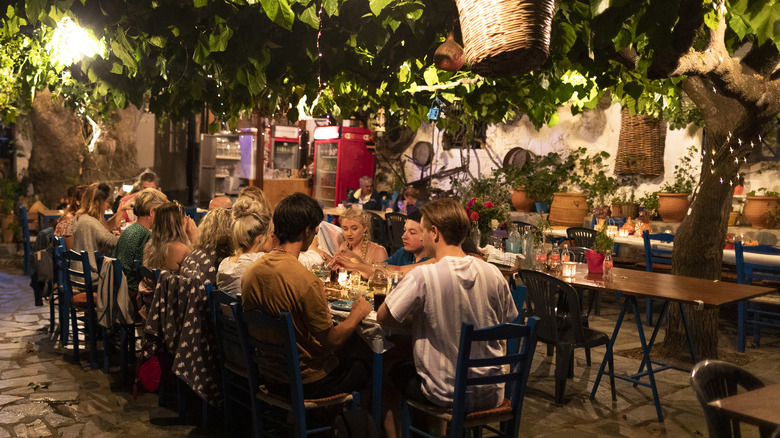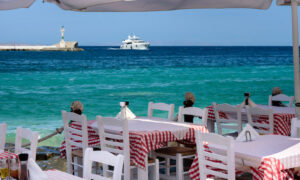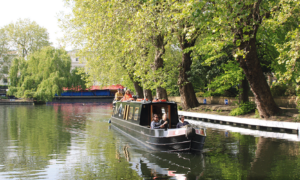(Editor’s note: This post on making friends in Greece by American in Athens Christina Hudson is part of a continuing series to help expats integrate into Greek life. See more of Christina’s posts here.)
So you’ve moved to Greece or you’re here for an extended stay … Kalos Eerthes! (Καλώς ήρθες! Welcome!) You’re more or less settled in your new home and routine and now: What to do in your free time?
You’ve seen all the classic tourist attractions in your area and now you are ready to explore real life. You want to meet some locals and start to feel at home in your new neighborhood.
What do Greeks do in their free time?
How can you create community here?
These are questions I hear often from those newly (and not so newly) arrived in Greece.
The truth is that, as a society, Greece has a long way to go when it comes to civic-mindednes. People here are typically hyper-focused on their own lives, families and very close friends so getting to know neighbors and fostering community among strangers is not emphasized much overall.
The good news is that some of this is changing with a slow transformation in the lifestyles and mindsets of younger Greeks.
An evolving society
Still, we have a way to go.
The idea of friends and neighbors becoming “chosen family” is definitely gaining ground though. The first thing you might notice is that it can take time to get to know your neighbors. Don’t expect a bunch of welcome baskets or invitations to barbeque parties right away.
Greece is a small country with only one major city (Athens). Thessaloniki and Patras take second and third place, though they both trail far behind in terms of population as well as job openings. As a result, people don’t move around the country much for work and other opportunities as they do elsewhere, simply because most of their prospects are only in one or two places.
Also, it should be said that people here generally keep a polite distance until they are sure they an trust you – sort of a “guilty until proven innocent” thing.
It is what it is!
The result is that many Greeks largely stick to their extended families and a smallish set of close old friends for much of their socializing. A good many don’t actually have much of a template for making space for new people and therefore default to their usual gang.
There are always exceptions (for instance, Greeks who have lived and/or travelled abroad) but by and
large you might find yourself having to make more of an effort than you would have to elsewhere in order to make friends.

Making friends
What sort of effort, you ask? Well, keep it simple, but a thoughtful and generous show of hospitality will be appreciated. It goes a long way here as it does anywhere.
• A nice meal with some good wine can bring people around your table and help you to start to form personal connections.
• If the people you invite have children, it will probably be appreciated if they are included in the invitation. Babysitting culture isn’t really a thing here. If the kids can’t go to grandma’s, they are going with the parents. Early bedtimes aren’t generally fussed over for young children so you don’t need to worry much about that.
• If you are invited for a meal or even a coffee or drink, be sure to bring something for your host/hostess. Whatever you do, don’t go empty-handed. One of the common stereotypes about ksenoi (ξένοι) aka foreigners/non-Greeks is that they are a bit tight-fisted. So don’t hold back; treating friends is an important part of the social norms here.
Hospitality can get crazy
You might even notice a competitive element to it. No need to get antagonistic about it, but I do suggest you buy the good wine, the bigger potted plant, the fancier cake – at least sometimes. Believe me, it will score you points.
You haven’t seen a battle until you witness two Greeks fighting over who will pay the bill – they might both literally lunge for it and then battle verbally (and quite aggressively) for the “privilege” of paying.
I had some friends I had wanted to treat for ages and they wouldn’t let me. So I had to outsmart them…. The last meal we had I excused myself for the bathroom but actually went and pulled the server aside and made her promise to hand me the bill directly when it was ready.
I won that match.
Sports and recreation
Speaking of matches – we all know that many people connect over sport, be it by watching it together on TV or by playing it with one another. For some of us, brisk walking is enough of a sport some days, so be sure to invite that smiley neighbor for a walk. It’s a good way to bond and is becoming increasingly popular in the city parks and around the suburbs to see pals walking and talking in the evening hours.
If you are looking for more calorie-burning while meeting people around town, wherever you are, you can probably find a municipal sports center. Each area usually has a few and they can be a good spot for meeting people who live in your neighborhood. There are municipal swimming pools, basketball courts, running tracks, gyms and so on.
They are often a bit shabby, but are also sometimes free for use for area residents and usually also offer a variety of lessons and classes (swimming, yoga, gymnastics for instance) at reduced rates. Many of the classes are aimed at children, but there are also ones for seniors and younger adults.
Due to public funding problems in recent years, sometimes private organizations operate classes in these facilities as well. Ask what you are signing up for when you go on. Those classes are usually a bit more expensive but sometimes of better quality. It is unfortunate that this is the case but that is what we have been seeing.
Cultural centers
Like the sports centers, you can find one in most areas. They sometimes organize and host traditional dance lessons, creative play sessions, writing groups, art lessons, amateur theater productions, musical performances and so on.
It’s a great place to find like-minded souls if the arts are your jam and what better way to bond than over the shared experience of working towards watercolor mastery or learning to play the bongos with another newbie.
––––––––––
Read more about Athens here in Dispatches’ archives.
A Pittsburgher by birth, Christina T. Hudson is also half Greek and has – so far – spent most of her life in Athens, the chaotic but captivating capital city of Greece.















